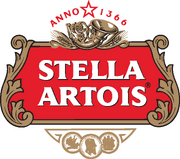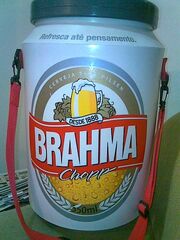InBev (Euronext: INB) is the second-largest brewery company in the world.[1] While its core business is beer, the company also has a strong presence in the soft drink market in Latin America. It employs about 86,000 people and is headquartered in Leuven, Belgium.
InBev was created in 2004 when the Belgian company Interbrew and the Brazilian company AmBev merged, creating the world's largest brewer.[2]
InBev has operations in over 30 countries and sales in over 130 countries.[3] In 2006 it had a market capitalisation of €30.6 billion and net profit of €3.2 billion on sales of €13.3 billion (£10.61 billion)
History[]

Stella Artois is the main beer brand of InBev
InBev was created in 2004 from the merger of the Belgian company Interbrew and the Brazilian company AmBev.[4] Before the merger with Ambev, Interbrew was the third largest brewing company in the world by volume, Anheuser-Busch was the largest, followed by SABMiller in second place. Heineken International was in fourth place and AmBev was the world's fifth largest brewer.
Pre-merger companies[]
Interbrew[]
- Main article: Interbrew
Interbrew's roots can be traced back to 1366 in Den Horen in Leuven when the Artois brewery was founded. In 1987 Artois, and the Walloon-based brewer Piedboeuf, came together to form Interbrew.[5] The move onto the international scene only happened when Interbrew acquired the Canadian beer brand Labatt. The transaction also included Labatt's assets, which included the Toronto Blue Jays baseball club, the Toronto Argonauts football club, and The Sports Network. The latter at the time was not much smaller than Interbrew, and since then the company had been considered a multinational with both Canadian and Belgian roots.
Some important Interbrew brands are Stella Artois, Boddingtons, Beck's, Staropramen, Jupiler, Leffe, Labatt, Hoegaarden and Bass.
In December 2001 Interbrew, Danone (former owner of Kronenbourg, and two other smaller brewers) were fined €91m for operating a cartel in Belgium while four Luxembourg companies were fined €448,000 the same month.[6]
AmBev[]

Brahma, one famous InBev's beer brand
AmBev was a Brazilian beer company formed by a merger in 1999 between the Brahma and Antarctica breweries. It had a dominant position in South America and the Caribbean.[7][8][9]
InBev[]
InBev announced in 2005 and confirmed in 2006 that it would move the brewing of Hoegaarden to the Piedboeuf brewery in Jupille, which resulted in some protests.[10] In September 2007 however, it was announced that brewing would continue at the Hoegaarden Brewery in Hoegaarden.
On May 23, 2008, it was reported that InBev is preparing a US$46 billion offer to purchase American brewing company Anheuser-Busch.[11] If successful, it would join two of the world's four largest brewing companies (based on revenue).
Brands[]
- Main article: InBev brands
InBev has over 200 beer brands produced and sold throughout the world.[12] The flagship brands are Stella Artois, Brahma, Beck's and Leffe.[13]
Attempt at Anheuser-Busch takeover[]
- See also: Anheuser-Busch
On June 12, 2008, InBev announced that it has made a US$46 billion offer for the brewing firm Anheuser-Busch.[14][15] If successful, it would join two of the world's four largest brewing companies (based on revenue) and create a company that brews three of the top beers in the world - Bud Light, Budweiser and Skol. InBev also stated that the merger would not result in any U.S. brewery closures and they would also attempt to keep on management and board members from both companies. [16] On June 25, 2008, Anheuser-Busch officially announced that they would reject InBev's offer and provide a restructuring of company to maintain shareholders and United States World Headquarters in St. Louis. [17]
References[]
- ↑ Bid talk boosts Budweiser maker. BBC News. 2008-05-23.
- ↑ Interbrew buys AmBev and becomes world number one 2004-03-03
- ↑ http://www.inbev.com/press_releases/20050330.1.e.cfm
- ↑ Interbrew buys AmBev and becomes world number one
- ↑ InBev
- ↑ Heineken and Grolsch fined for price-fixing
- ↑ AmBev - Companhia de Bebidas das Américas
- ↑ Stock symbol abv - Gstock
- ↑ BBC NEWS - Alcoholic beer taster gets payout
- ↑ Pierre Celis, Hoegaarden
- ↑ InBev working on $46 bln Anheuser bid: source
- ↑ InBev
- ↑ InBev
- ↑ InBev working on $46 bln Anheuser bid: source
- ↑ InBev Proposes Combination with Anheuser-Busch
- ↑ InBev: U.S. Anheuser Breweries to Stay After Merger accessed 2008-06-20
- ↑ Anheuser-Busch set to snub InBev and propose own revamp 2008-06-25
See also[]
- Paul De Keersmaeker
- Alexandre Vandamme
External links[]
- Official corporate website
- Company Profile from Yahoo!

|
This page uses content from Wikipedia. The original article was at InBev. The list of authors can be seen in the page history. As with Beer Wiki, the text of Wikipedia is available under the Creative Commons Attribution-Share Alike License 3.0. |